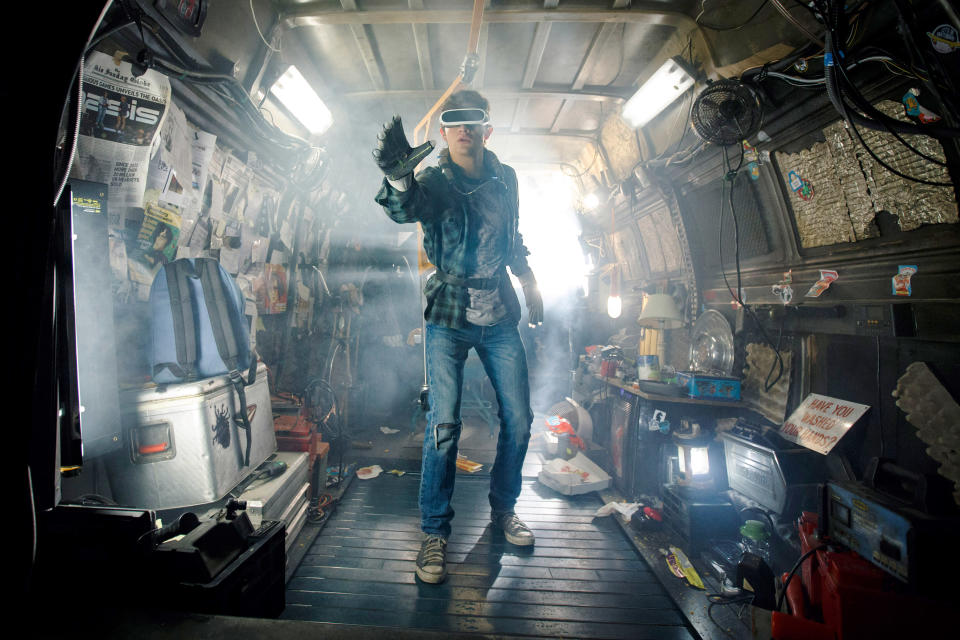Tye Sheridan Co-Founded an AI Start-Up, but He Still Gets Why Movie Lovers Are ‘Skeptical’ About Its Technology

When you picture the co-founder and president of an artificial intelligence film production start-up, odds are, you’re not thinking of someone like Tye Sheridan, an actor and producer who literally got his start when Terence Malick discovered him at age 11 during a casting call for his “The Tree of Life.”
But Sheridan — who is continuing to expand his on-screen range, adding producing into the mix and targeting writing and directing opportunities that would allow him to make films like his heroes Malick, Jeff Nichols, and David Gordon Green — is also the co-founder and president of Wonder Dynamics, a production tools startup that uses AI to scale up visual effects and computer-generated characters. And, ideally, yes, the productions that use those tools will be indie.
More from IndieWire
Alex Garland on Life After 'Civil War': 'I'm Not Planning to Direct Again in the Foreseeable Future'
Sheridan is clear: The “Wonder Dynamics mission … is to enable Hollywood-level movies on an indie budget.” When Sheridan and visual effects artist Nikola Todorovic first announced their venture in late 2020, Variety explained that their “new AI production tool … will let independent artists produce dazzling VFX and CGI animations for far less than is required today.” At the time, the tool was known as Wallace PROduction, but when it launched in July 2023, it had been re-branded as Wonder Studio.
These days, Wonder Dynamics has over 70 employees, and the Wonder Studio platform is billed as “an AI tool that automatically animates, lights and composes CG characters into a live-action scene.” It’s, per its website, “a FVX studio in your browser,” and a number of available demos show off some wild examples, including full body motion capture that replaces a human actor with a CG creation. In short, it looks cool, but what does that mean now and in the future?
When I mentioned that movie lovers, filmmakers, and many of IndieWire’s own readership don’t feel positively about the rising technology — “skeptical,” he added — Sheridan didn’t balk. He knows The Daniels are “really terrified” of it. He knows that Tyler Perry was worried enough about its implementation that the filmmaker and super-producer said he put his studio expansion plans on hold. He also knows that we just don’t know what it’s going to do yet.
“Understandably,” he said. “Well, I won’t say that AI is something that shouldn’t scare people, in general. I think that to say that AI is anything in general is too broad, it’s too complex. I think you have to consider exactly how it’s being used in each instance to then make an assessment of whether it’s an ethical use of AI or not.”
Sheridan and Todorovic caught on early to the power of AI and the potential it might have in Hollywood. “The big thing for us [was], look, it’s inevitable,” Sheridan said. “That’s the whole reason that we, back in 2017, 2018, really started to focus on AI. We started doing all of this research in the fields of robotics and autonomy for self-driving cars. Looking at these image perception models, realizing, ‘Holy shit, this is going to be the future of our industry one day, undoubtedly.’ So we kind of started selfishly building technology because we wanted to make big movies, … and then we realized, ‘Oh, wow. Well, this is much bigger than that.'”
Given his roots, it’s understandable (and a little reassuring) that Wonder Dynamics was founded on Sheridan and Todorovic’s hopes that the technologies they were pursuing could be most helpful to the indie sector.
“There’s a lot of people out there like us who want to make movies and they just don’t have access,” he said. “Hollywood is very localized, especially at that level when you’re trying to make large-scale films. And, of course, large-scale films draw audiences. People do want to see spectacle movies now, and that’s just what it is. I think the problem with that is that it costs so much, and so it’s really hard to take risks for a studio because the film costs 200, 300, $400 million. So you need to make it for everyone, or else you’re not going to make your money back.”
What that means — or, at least, what Sheridan is betting on — is a technological tool that can make indie-budgeted movies look big without a big price tag. The Wonder Dynamics website currently lists several pricing plans, starting at $16.99/month for a “lite” subscription billed as an “ideal starter plan,” with options to scale up to more tailored (and pricier) options.
“The potential that AI presents is to allow us to make bigger movies but on a lower budget and potentially take more risk as storytellers. I think that’s really exciting,” he said. “Maybe if we’re not spending $200 million on each movie, maybe we can make more of them, maybe we can employ more actors, maybe we can employ more artists. I think I’m obviously more of an optimist when it comes to this. I do think that the industry needs to collectively come together around this and be talking and having discussions and educating themselves on AI and its impact on our industry and the potential impact that it might have.”
Still, Sheridan gets the trepidation. This is crazy stuff. “It’s natural to be defensive,” Sheridan said. “When something poses the potential to fundamentally change your industry in such a substantial way, you can’t ignore that. The natural mechanism is a defense mechanism, we feel like we need to defend ourselves, our careers, our position, our role. It’s like the advent of the internet. People were terrified, people thought, ‘Oh, it’s going to take away everyone’s jobs and replace them,’ and the truth is that it created a lot of opportunities. I do see that potential in AI for storytellers all over the world.”
So how does this actually work? As Sheridan explained, he and Todorovic’s company uses “25-plus machine learning models” on their platform “that basically calculate everything from an actress performance, their movement, extracts the animation data from that, the lighting in the scene, the compositing, the way the camera moves, and it’s ingesting all these elements that are happening in your scene, and then it basically packages it in a way that allows artists to go and continue working on it.”
Sheridan said the tool can speed up the animation process by “up to 80 percent in some instances. “It’s not really a tool to replace artists; it’s focused on speeding up their process and creating opportunities that didn’t exist for artists before.”
As for what’s next? Sheridan is betting on something everyone should be able to agree on the need for: regulation in the space. “I feel like we’re going to see a lot of regulation in the next year or so,” Sheridan said, pointing to the un-sexy but highly important question of IP and copyright infringement. “Can Disney use Sora? Or can Warner Bros. use Sora? Are you going to see them being used at this legacy studio level? I know for a fact how concerned these studios are about what these tools are trained on because if Warner Bros. goes and uses Sora on their next big film, and they’re using a tool that was trained on Disney IP, that’s a major copyright issue and IP infringement issue.”

Sheridan also seems eager for increased education about what AI can and can’t do and how that will impact movie-making on all levels. “Obviously, [there was] a lot of controversy during the strikes around AI, and rightfully so, but I did see a lot of people and hear a lot of people speculating on AI and what it could do,” he said. “People were quick to jump to the conclusion that it was going to replace everyone, and that’s not at all the case. It’s very limited actually, what you can control in these models. [Filmmakers] have a unique vision. They want to shoot things a certain way, and move the camera a certain way, and they want for their actors to be performing at a certain level. It needs to be consistent across the board. You need to maintain a certain consistency, and that’s really hard with these text-to-video models, for now.”
Well, for now. But Sheridan’s present is focused on setting up a future in which AI is harnessed properly. “I think it will inevitably affect our industry in many ways,” she said. “I think it’s up to us to determine exactly how we welcome AI into our industry and then make sure we’re doing it ethically and maintaining the integrity of artists because, without that, you lose the magic.”
Best of IndieWire
Sign up for Indiewire's Newsletter. For the latest news, follow us on Facebook, Twitter, and Instagram.


